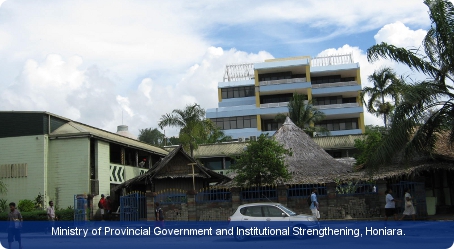Government
- Overview
- History

Solomon Islands is a constitutional monarchy with Queen Elizabeth II as head of state, represented by a governor-general who must be a citizen of the country. The governor-general is elected by parliament. The prime minister is also elected by parliament. The prime minister chooses the other members of the cabinet, who are collectively responsible to the House of Assembly. The cabinet is vested with executive power.
The governor-general appoints the chief justice of the Supreme Court on the advice of the prime minister and leader of the opposition.
The unicameral National Parliament has 50 members, who are elected for a four-year term in single-seat constituencies. Solomon Islands has a multi-party system with numerous parties, with little chance of one party gaining power alone; parties must work with one another to form coalitions. Representation is based on single-member constituencies and there is universal adult suffrage.
Honiara has a town council for local government, and there are provincial administrations in the nine provinces.
The High Court is headed by the chief justice, the Court of Appeal by a president. This is the final court of appeal and its members include senior judges from Australia, New Zealand and Papua New Guinea, together with the chief justice and High Court judges.
The High Court tries the most serious civil and criminal cases, the magistrates’ courts having jurisdiction only in less serious cases. Community elders sit in local courts which have jurisdiction in customary law and local by-laws. There are also the customary land appeal courts.

Solomon Islands is an archipelago made up of nearly one thousand islands, and is situated to the east of Papua New Guinea in the continent of Oceania. The nearest neighbour to the south-east is Vanuatu.
Archaeological evidence suggests that Solomon Islands have been inhabited since at least 1000 BC. European penetration began in 1568 in the shape of the Spanish explorer Alvaro de Mendana, nephew of the governor of Peru. Mendana’s choice of name for the Solomon Islands meant that today it is the only state in the world that is named after a biblical king.
In 1893 Britain made the South Solomons (Guadalcanal, Salvo, Malaita, San Cristobal, the New Georgia group) a protectorate, to which the Santa Cruz group was added in 1898 and 1899. In 1900 Germany ceded to Britain the Shortlands group, Santa Isabel, Choiseul and Ontong Java.
Some of the bitterest fighting of the Second World War took place in Solomon Islands. Guadalcanal was the scene of a six-month battle which was crucial to the outcome of the war in the Pacific. The Solomon Islanders fought on the side of the allies.
After the war, the movement for self-determination gathered strength. In 1975 the name ‘British Solomon Islands Protectorate’ was changed to the present name. Self-government was achieved in 1976 and independence followed two years later under the leadership of Peter Kenilorea.
In the latter part of 1998, growing inter-communal tensions in Guadalcanal Province became violent. In June 2003 the then prime minister Allan Kemakeza accepted Australia’s offer to lead an international intervention force to re-establish law and order.
In the 2006 election, Kemakeza retained his seat but his People’s Alliance Party was much reduced; Synder Rini’s Association of Independent Members (AIM) did well, with 13 new elected members. Rini was subsequently elected prime minister, though he stood down in the same month when he lost the support of the majority in parliament.
In 2010 the Solomon Islands Democratic Party, led by Steven Abana, won the majority of seats, securing 14 of the 50 seats in the National Parliament, more seats than any other single party. In the parliamentary vote that followed, Danny Philip, leader of the Solomon Islands Reform and Democratic Party was chosen as prime minister.



